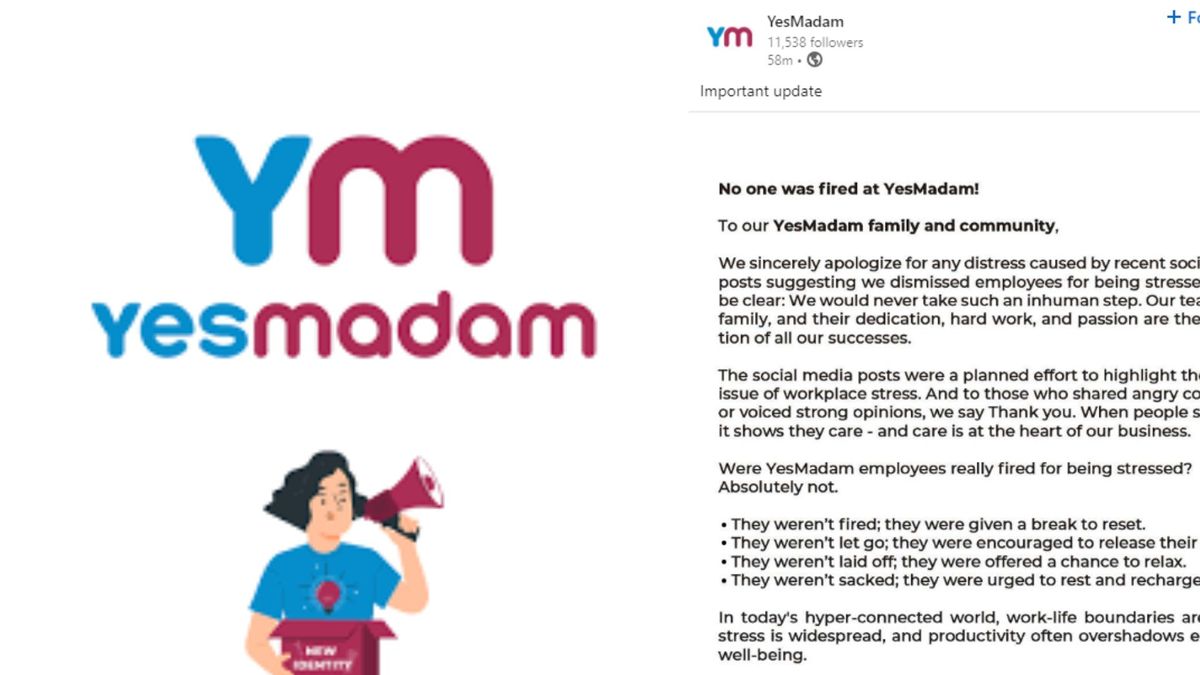 |
|
The recent controversy surrounding YES Madam, a Noida-based doorstep beauty platform, highlights the complex and often fraught relationship between corporate initiatives aimed at addressing employee well-being and their actual implementation. The initial reports, widely circulated on social media platforms like LinkedIn, painted a stark picture: employees experiencing stress were allegedly informed via email that their employment had been terminated, effective immediately. This action sparked immediate and widespread outrage, with many criticizing YES Madam's purportedly insensitive and counterproductive approach to managing employee mental health. The speed with which the story spread underscores the sensitivity of this issue, particularly in the current climate where employee burnout and mental health concerns are increasingly recognized as critical factors impacting productivity and overall workplace morale.
However, the narrative took a significant turn the following day. YES Madam issued a public statement, clarifying its intentions and vehemently denying that the terminations were intended as punitive measures. Instead, the company claimed that the email notifications were part of a carefully planned campaign designed to raise awareness about workplace stress and its devastating consequences. This explanation, however, was met with a mixed reception. While some acknowledged the company's attempt to address a critical issue, many remained skeptical, pointing to the potential for misinterpretation and the deep emotional distress caused by the initial actions. The fundamental question remained: was this a poorly conceived attempt at raising awareness or a tone-deaf PR strategy that severely underestimated the potential damage?
Regardless of the intent, the incident served as a stark reminder of the delicate balance required when tackling sensitive issues like employee well-being within a corporate environment. The damage to the company's reputation was considerable, even if the subsequent apologies and the introduction of new employee wellness programs were well-intentioned. The ensuing discussion illuminated the need for a more nuanced approach to employee communication and engagement, particularly when dealing with potentially stressful or emotionally charged subjects. A successful initiative requires not just a sound concept but also careful consideration of the message delivery and potential impact on individual employees.
The subsequent launch of YES Madam's 'Happy 2 Heal' program, featuring in-office head massages and spa sessions, and the 'De-stress Leave Policy', offering up to six paid leaves annually for mental health, represents a concrete effort to address the criticisms and demonstrate a genuine commitment to employee wellness. However, the effectiveness of these initiatives will depend heavily on their implementation. Simply offering these benefits is not enough; the company must foster a culture of open communication, provide adequate support to employees struggling with mental health, and ensure that these benefits are actually utilized without fear of retribution or stigma. The success of these programs will determine whether this episode serves as a cautionary tale or a catalyst for positive change within YES Madam and the broader corporate landscape.
The YES Madam case serves as a case study in the challenges of corporate social responsibility and the implementation of employee well-being initiatives. While the company’s attempt to raise awareness regarding workplace stress was commendable, the execution was deeply flawed. The incident underscores the critical need for organizations to carefully consider the potential consequences of their actions, prioritize transparent and empathetic communication, and create a supportive work environment where employees feel empowered to prioritize their mental health without fear of negative repercussions. The long-term impact of this incident will depend on YES Madam’s ability to demonstrate genuine commitment to its newly announced initiatives, fostering a culture that genuinely values and supports the well-being of its employees.
Source: YES Madam's termination email unveiled as campaign to address workplace stress
